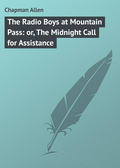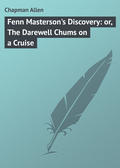
Chapman Allen
Tom Fairfield at Sea: or, The Wreck of the Silver Star
CHAPTER XII
A MUTUAL SURPRISE
“Davy Jones!” gasped Joe Weldon, as he too looked into the boat he had towed to the derelict, and saw the man. “Another passenger!”
“And a dead one, too, I reckon,” added Abe, grimly.
“Let’s make sure,” suggested Tom. “We must get him aboard here, unless that boat is better than the derelict. Maybe we had better take to that.”
“No,” decided Joe, after a careful look. “She’s stove in, and only her water-tight compartments keep her afloat. It wouldn’t be safe to get into her. Our own craft is better.”
“Then we must get him aboard here,” went on Tom. “That is, if he’s alive.”
“And we must get some of that drinking water out of the boat, too,” went on Abe. “It’s just what we need.”
“Maybe there’s food, also,” suggested Joe. “It’s a good find all right, even if the boat is a wreck.”
“Is my daddy in it?” asked Jackie.
“No,” replied Tom sadly. “But, Jackie I’ll tell you what we’re going to do. We’ll make a little house out of part of that boat, and we can sleep in it.”
“Really and truly, Tom?”
“Surely.”
“And we can camp out?”
“Yes. Now you go away up, on that high part of our ship and stay there while we pull the sick man out of the boat.”
Tom put Jackie on the highest part of the derelict over which the waves did not break. In fact, now that the sea had gone down, their situation was not so bad, for they were getting dry.
“Come on now, mates, all together,” proposed Joe. “We’ll haul the man out first, and then see what’s in the boat that’s of any use to us. All together, now!”
It was no easy task to get an unconscious man from the boat, nearly awash, to what might be called the deck of the derelict. But they managed it, and he was made as comfortable as possible.
“Some of that canvas will come in handy,” remarked Joe, as he pulled a large piece of it from the lifeboat. “And here are two kegs of water, and some cases of tinned food. We won’t starve, or die of thirst, right away.”
“Right you are, mate,” agreed Abe. “Now if we could only get this boat up on the derelict, we might use the planks for making a shelter, as Tom said. Let’s try.”
It was even harder work than hauling the unconscious passenger up on the deck, but the sailors knew their business, and with Tom to help them and taking advantage of the swell of the sea, and an occasional big wave, they did manage to get the wrecked lifeboat up on the derelict by hauling on ropes attached to her.
“And it’s a good thing we didn’t try to go to sea in her,” commented Abe, as he looked at the holes stove in the craft. “Even with the water-tight compartments we couldn’t have gone far. She must have been rammed by some of the wreckage after this man was in her. Do you know him, Tom?”
“Yes, I know him,” was the quiet answer. “Let’s get the boat a little higher up.”
“All together – heave!” cried Joe, and they worked the craft farther up on the derelict.
“There’s an axe!” cried Tom, as the bottom of the lifeboat became exposed, when the water ran from her through the rents and gashes. “That will come in handy.”
“That’s what,” agreed the sailors.
Now that they had their prize secure, they turned their attention to the passenger who had so unexpectedly come to them. He seemed to be still unconscious, but Tom, feeling of his wrist, detected the movement of a pulse.
“He’s alive,” he said.
“Then the sooner we get the water out of him the better,” spoke Abe. “Though I don’t believe he got much into him, for he was sitting high in the boat, and she hadn’t shipped so very much.”
Then they began to work over the unconscious man, Tom thinking meanwhile of the irony of fate that had again thrown him into contact with the character in whose life he had played so strange a part.
“He’s coming around,” announced Joe, after a bit.
“Yes, I guess so,” assented Abe.
The man sat up. His eyes roved about as though he could not understand where he was. He looked first at Abe, then at Joe, and then sought little Jackie, who was seated on the highest part of the derelict where Tom had sent him. Then the gaze of the man went to Tom’s face.
Over the countenance of the man came a tinge of fear, and Tom smiled grimly. He saw the features of the man as they had been on the day when he came aboard the Silver Star in such a hurry – a smooth-shaven face – the face on which Tom had seen the man adjusting a false beard in his stateroom that day.
The mysterious passenger gasped. Then he said:
“You – you here – Tom – Tom Fairfield?”
“Yes, I’m here, Professor Skeel,” announced our hero calmly, as he faced the former Latin instructor of Elmwood Hall – the teacher against whom he had led such a successful revolt. “I’m here, and I’m surprised to see you here.”
“No more – no more than I am to be here – and to see you,” came the grim answer. “It’s a mutual surprise I fancy.”
“Yes,” agreed Tom simply.
“Do you know this man?” asked Joe. “This Mr. Trendell?” for, somehow, the sailor had learned the name by which the renegade professor had gone.
“I don’t know him by that name,” spoke Tom, “but it doesn’t matter I fancy. We have other things to consider now.”
“All right,” agreed the sailor. “It’s none of my affair. Only when a man goes by two names – ”
“What business of yours is that?” snapped Mr. Skeel, with a return of his old, overbearing classroom manner.
“Nothing, of course. But I’ve got a right to make a remark, and whoever you are, I’d remind you that we’ve saved your life.”
“And what’s more,” went on Abe, “we’re all equal here. We’re not on board a ship now, and there’s no captain, unless we elect Tom here, which I vote we do.”
“Second the motion,” came from Joe. “How’s that, Captain Tom?”
“I – I’ll not serve under him!” muttered Burton Skeel. “I won’t take orders from him.”
“Then you can go adrift again, and shift for yourself if you like,” spoke Joe sharply. “The majority rules here, and Abe and I vote for Captain Tom.”
“Oh, I don’t know enough about a ship to be captain,” spoke our hero.
“You don’t have to know much about a ship to navigate this water-logged craft,” said Joe. “Captain we’ve voted you, and captain you’ll be. There has to be some one to give orders, and you’re him. If this Professor Skeel, as you call him, or Mr. Trendell, as we knew him, doesn’t like it he can go elsewhere.”
“Oh, I suppose I must give in,” said the new passenger bitterly.
“That’s all that need be said,” commented Abe, “and if you’ve got a secret you can keep it. We won’t ask any questions, will we mate?”
“Not I,” growled Joe. “Now then, Mr. Trendell – ”
“You might as well call me Skeel,” said the owner of that name. “Since Tom Fairfield knows me there is no use trying to hide my identity. Not that I have anything to conceal,” he added hastily.
“All right,” agreed Joe. “Now then, let’s make this lifeboat fast in a little better shape, and then we’ll chop off some of the planks and build a sort of shelter. Then we can think about breakfast – that is if the captain says so.”
“Surely,” assented Tom with a smile. “Do as you think best. You know much more about it than I do.”
The two sailors busied themselves, while Jackie looked on interestedly. Mr. Skeel, who was rapidly regaining his strength, after a drink of water, and a bite of biscuit and meat, crawled to Tom.
“Are – are you going to inform on me?” he asked.
“Certainly not,” replied our hero. “I’m done with you. I have no wish to trouble you further. I think you acted very unfairly toward our class, and what you did to my friend Bruce Bennington was criminal, but he does not want to prosecute you, so neither do I.”
“You little knew the temptation I was under,” said the former professor humbly. “I make no explanations, but I will say that I have decided to live a better life. I was going to try in a new country to redeem the past. I had no idea you were on the Silver Star when I engaged passage under another name, and when I saw you, after I had disguised myself, I was greatly startled. I kept to my room, and even thought of adopting another form of false beard and moustache so you would not know me.”
“I recognized you,” said Tom simply. “However, you need not fear me. I will say nothing, and I hope that you can better yourself in your new situation. That is all that need be said.”
“I suppose so,” spoke Mr. Skeel gloomily. “This is a bad beginning for a new life, though – a wreck.”
“How did you come to get in the boat?” asked Tom.
“I hardly know. There was so much confusion. I came up on deck after the crash, and waited for the order to get into the boat. Some one helped me in. I was the only one in it when the second crash came, and suddenly the boat seemed to fall into the sea. I received a blow on the head, and then I knew no more until I found myself aboard this derelict. I suppose I must thank you for saving my life.”
“Not at all. It was Joe who swam out and brought in your boat. I am sorry for you. We will say no more about it. There is a hard enough task ahead of us as it is, to save ourselves.”
“Do you think we can?”
“I don’t know. It all depends on whether we can get to an island where the natives will be friendly enough to give us aid, or if we are picked up by some vessel. We will hope for the best. We have food and water, but not much of a craft under us. However, since your boat is here, possibly we can make some kind of a structure to shelter us.”
The two sailors, with the piece of canvas that had been found in the lifeboat, and with some pieces of lumber which they managed to chop out of the derelict, were constructing a shelter on the after portion of the wreck – on the highest part.
“Oh, Tom!” called Jackie, who sat beneath this improvised awning, “come under my tent!”
“I will,” answered our hero with a smile.
“And bring me something to eat,” commanded Jackie. “I’m hungry. I want my breakfast, and I want my daddy. When will he come, Tom Fairfield?”
“I don’t know. Soon, I guess. Now we’re going to play at soldiers, camping out, and we’ll have breakfast in our tent. Won’t that be fun, Jackie?”
“Indeed it will. Hurry up, Tom!”
Tom smiled sadly, as he collected some food and water from where the stores had been put. And yet, in a way he was glad he had this little boy in charge now, for it kept him from brooding over his own troubles.
“I don’t see how I’m ever going to rescue dad and mother when I’m wrecked myself,” reflected Tom. “But it’s too soon to give up yet,” and he closed his teeth grimly, to keep back the tears that wanted to come.
CHAPTER XIII
UNDER SAIL
“Now, Jackie, what will you have?” asked Tom briskly, as he sat under the canvas shelter with the little lad. “Will you have ice cream, or bread and milk, or a boiled egg or some cut-up pineapple, or cup custard, or any of those things for your breakfast?”
“Oh, Tom, have you really got ’em?” asked the child eagerly.
“Why, yes, of course. We always have those things on wrecks – make-believe, I mean,” added Tom quickly.
“Oh, make believe,” and Jackie was a trifle disappointed.
“Surely. Now here is some nice pineapple to start off with,” and Tom shredded up some canned tongue, put it between two ship biscuits, and passed it to the boy. Jackie laughed as he took it, and soon was eating hungrily.
“Is it good – that pineapple?” asked Tom.
“Fine.”
“Then try some of this nice mooley-cow milk to wash it down with,” suggested our hero, as he passed over a tin cup full of water. “The milkman just left it for you.”
“Oh, Tom!” cried Jackie, “it’s just like a story in a book.”
“And I hope you keep on thinking so,” murmured Joe as he nodded at Abe while they further made fast the canvas shelter.
Mr. Skeel helped himself to some of the food, as did the two sailors when they had finished with their temporary work, and Tom ate also.
“Now, Jackie,” he said, when he had finished, “here is my knife,” and he took it from his pocket. “It got all wet when I had to swim last night, but it will cut yet, and I want you to whittle out some wooden soldiers, and we’ll play a game pretty soon. You just sit here and whittle, and take care not to cut yourself.”
“What are you going to do, Tom?”
“Oh, I’m going to get ready to make a wooden house for us to live in,” was the answer.
Tom motioned for the two sailors to follow him to the other end of the wreck. It was lower there, but now that the sea had gone down the waves did not break over it. The stern was really well out of the water.
“What is it?” inquired Joe when he and his shipmate had joined our hero.
“I think we had better take an account of stock,” suggested Tom. “See how much food and water we have, how long it will last us, and what we had better do.”
“Right you are, captain!” exclaimed Abe admiringly. “I knowed we didn’t make no mistake when we elected you.”
“First then, the food,” suggested Tom. “How long will it last us?”
Joe and Abe collected it – that which they had brought with them on the abandoned life-raft, and that which had been in the boat in which Professor Skeel had been found. That individual was sitting on the stern, gazing moodily off into the distance.
“Well, if we don’t stuff ourselves too much, and keep at the drinking water every time we’re thirsty,” said Abe, “we’ll have enough here for a week, at least.”
“Good!” exclaimed Tom. “In that time something ought to turn up.”
“If we don’t turn up ourselves,” commented Joe grimly.
“Here! Stow that kind of talk,” said his mate quickly. “We’ve got a captain who’ll navigate us anywhere we want to go.”
“I only wish I could,” spoke Tom. “The next thing to think of is making some better kind of a shelter. Can we do it out of the wood we have at hand?”
“I don’t see why not,” said Abe. “Joe here used to be a sort of carpenter, and I’ve worked at the trade too. We have only an axe, but that’s better than nothing.”
“Then let’s make a sort of deck house,” suggested Tom. “That canvas awning won’t be much good in a storm.”
“Right, captain!” exclaimed Abe. “What next?”
“That’s all for the present. And I guess that’s enough.”
They first put the food and water in a safe place, on the highest part of the derelict, lashing it fast with ropes found in the lifeboat, so that it would not wash away. Mr. Skeel wanted to help in the work, but at the first knot he tied Abe exclaimed:
“That’s too land-lubbery for me! It would fetch away at the first roll of the derelict. You’d better take the axe and see if you can get out some planks.”
It was hard work, but to the credit of the former teacher be it said that he did manage to chop out some of the planks. He worked through a hole in what had been the deck of the lumber vessel, for she had been laden with planks in all her holds.
Soon quite a number of planks were at the service of the sailors, who had finished securing the food. Jackie was still cutting away at the toy soldiers, producing a vast quantity of shavings but not much else.
It was no easy task to make a wooden shelter, with no nails with which to fasten it. But they made pegs of wood, chopped out with the axe and whittled with the sailors’ knives and these served to hold the planks together and to the deck of the derelict.
An inverted “V” shaped structure was made, with one end closed by boards, and the other by a square bit of canvas. This had been built over the place where the stores had been lashed fast, and made a sort of deck house.
“Now then,” said Tom, “we don’t need the canvas awning, and so we might as well take it down. It will do for beds.”
“Beds!” cried Joe. “Something better than that.”
“What?” asked Tom.
“For a sail! Look, we aren’t moving anything to speak of now, only as the currents make us drift. Why not make some sort of a sail, and take advantage of the wind?”
“Of course!” agreed Tom, wondering why he had not thought of that before.
“And we’ll need a rudder to steer with,” added Abe.
“Certainly,” assented his mate. “We can rig up one out of some of the planks.”
“Then hoist the sail, by all means!” cried Tom.
It was no easy work to chop out a rude mast from one of the planks, set it upright and bend a sail to it, made from the canvas shelter. But they did it at last. Then a rudder was made from another plank – a crude and unsatisfactory affair but which served in a measure to guide the derelict.
The canvas was hoisted. Its end was made fast. It filled with wind, flapped and then bellied out.
“Hurray!” cried Tom in delight.
“We’re under sail!” shouted Abe.
“And now to lay a course,” added Joe. “Maybe we can get somewhere with this ship after all.”
CHAPTER XIV
DREARY DAYS
Like some castaways on a desert island, when they have discovered a sail in the distance, so it was with Tom and the others when they found that their water-logged craft was really making headway with the rude sail they had hoisted. It seemed to them that now they could really navigate to some place where they would be saved from death at sea.
“She’s really slipping along,” remarked Joe.
“And with some speed, too,” added his mate.
“She answers the helm,” observed Tom, who was in temporary charge of the rudder, as he shifted the rough handle and noted a change in the course of the derelict.
“Well, yes, she does, but you can’t count on it much, captain,” spoke Abe. “That is to say we’ve got to keep more or less dead before the wind. No fancy tacking, sailing great circles, or anything like that. No frills; it’s plain sailing for us.”
“And that will do as well as any other I reckon,” put in Joe. “If we keep on dead ahead long enough we’re bound to fetch up somewhere or other, I lay you that, and you’ve sailed in these seas as much as I have, Abe Weldon. How about it?”
“Well, yes, I reckon so,” was the answer. “There’s islands a-plenty around here, if we can fetch one. And there ought to be more or less of vessels making in and out, for there is lots of trade with these same islands. So if we don’t hit an island we may be picked up, if we keep moving.”
“Then we’ll move, as long as there’s wind,” decided Tom with a laugh.
“Can I sail the ship?” asked little Jackie, abandoning his play of cutting out soldiers. “I want to steer.”
“You may help me,” promised Tom. “Come and help push.”
The rudder, if such it can be called, had been hung over the stern of the derelict. It was like some huge sweep, or oar on a raft, but it served the purpose. While Tom and his little charge were at this task, Joe and Abe further made secure the wooden deck house they had made. Professor Skeel helped them, but he was a moody assistant, and while the two sailors joked and sang he maintained a glum silence.
“Well, we’re in pretty good shape, considering what happened to us,” finally announced Joe. “What time does the dinner gong ring, captain? It looks to me like eight bells now.”
“My watch has stopped,” said Tom, taking his water-soaked timepiece out of his pocket, “but – ”
“The sun is good enough bell for me,” laughed Abe. “It’s twelve now, if I’m any judge,” and he looked up at the ball of yellow fire in the sky.
“Then we’ll eat,” decided Tom. “Shall I steer while you – ”
“No sir!” exclaimed Joe. “Captain’s table is first, always. I’ll mind the wheel, not that there’s much steering to be done, only we might as well have things ship-shape while we’re at it, I suppose.”
The meal was not an elaborate one, but there was no disposition to find fault – at least on the part of the more mature members of the shipwrecked party. As for Jackie, Tom played the “pretend” game with him once more until the child was satisfied that canned beef was roast chicken.
The water they had to drink was warm, and not very palatable, but they made the best of that, too, thankful that they had any with which to cool their parched throats.
After dinner they made a more complete survey of the derelict, which had not been possible earlier in the morning, as the sea was still running rather high. Now the ocean was like the proverbial millpond, and only occasionally a wave washed slightly over the submerged bow of the craft.
“The forward companionway is almost out of water,” observed Joe, looking thoughtfully at it. “If we could lighten the ship a bit I believe I could get into it.”
“What good would it do?” asked Tom.
“Well, I might be able to fetch up something. Maybe some stores – something to eat. Tinned stuff keeps a good while, even under water.”
“How long do you think this vessel has been wrecked?” asked Tom.
“No telling. A year maybe, longer perhaps. It’s in pretty good shape. I can’t see anything to tell her name by or anything like that.”
They all looked about them at the mystery of the sea. Whence had the vessel sailed, and to where? What had become of her captain and crew? They were questions that could not be answered.
“She’s a mystery, the same as what has become of the rest of the folks of the Silver Star,” remarked Abe. “I wonder if that lifeboat got away safely? Was the captain saved? Them things always comes to a man after he’s been saved.”
“Hush!” exclaimed Tom, nodding toward the child.
“That’s right,” agreed Abe. “We’ve got to keep it from him, poor little kid.”
But at present Jackie seemed happy enough, and he gave no thought to the possible loss of his father. He was content to be with Tom, and help to steer the derelict, which task he assigned himself with whoever was at the wheel. That is all but with Mr. Skeel, and, somehow or other, Jackie took a dislike to the stern man. Nor did the former Elmwood Hall instructor seem to care. He performed his duties in solemn silence.
All that afternoon they sailed on, eagerly watching for the sign of a sail, or the sight of some island. But nothing rewarded their gaze.
“I guess we must be in a pretty watery part of the ocean,” remarked Abe grimly.
“Oh, we’ll fetch up somewhere, sooner or later,” declared his mate.
“Where am I going to sleep to-night, Tom?” asked Jackie, as it began to get dusk, the sun sinking down behind the waves in a glory of gold that promised a fair day on the morrow.
“With me, of course, Jackie,” answered our hero. “We’ll sleep under the wooden tent.”
“In the dark?”
“Oh, yes, in the dark.”
“But I don’t like the dark.”
“It’s better than the light, Jackie dear. The mosquitoes can’t find you to bite you in the dark.”
“All right. I don’t like the dark, and I don’t like the miskeeters, either. Will you hold my hand?”
“Yes, Jackie.”
“No, we can’t make a light, worse luck,” murmured Abe. “I’ve got some matches, that I always carry in a water-tight case, but it might not be altogether safe to make a light on a lumber derelict, even if she is partly water-logged. She might take fire.”
“What was your idea of a light?” asked Tom.
“A signal, my lad. Our sail, small as it is, can be pretty well seen in the daytime, but at night we’re just nothing, and if a vessel should happen along, and we were in her path – ”
“However, we’ll trust to luck,” went on Abe.
He did not finish, but they all knew what he meant.
“We can’t kick against Providence. Now let’s have grub and turn in. Captain, will you name the watches?”
“Name the watches?” asked Tom.
“Yes, some one has to be on duty all night, for we might sight a light and a hail would bring help.”
“Oh, I see. Well, I think you or Joe had better do that, knowing more about it.”
“Very well, then I’ll take from eight to eleven, Joe can take from eleven to two, and Mr. Skeel from two to five. By that time it’ll be light.”
“But where do I come in?” asked Tom.
“You’ll stay with him,” whispered Abe, winking his eye, and nodding at little Jackie. Then Tom understood.
The night passed without incident, the child sleeping peacefully with Tom. Some pieces of the canvas served as a bed, and little was needed in the way of covering, for it was quite warm, and their clothing had dried out.
“No vessels sighted?” asked Tom in the morning, as they prepared for the simple breakfast.
“Not a one,” answered Mr. Skeel shortly. “I don’t believe we’ll ever be rescued.”
“Oh, stow that kind of talk,” commanded Abe, half roughly. “Of course we will. Why, our voyage has only just begun.”
Dreary days followed. The food and water was divided with scrupulous care, for there was no telling how long the scanty store of each would have to last. They went on three-quarter rations – that is, all but Jackie, who had his full share, though in the matter of water he did not use as much as any of the others.
The hours and days passed, and their straining eyes saw no sign of a sail, and no welcome land loomed into view. Their progress was slow – slower than they had any idea of, for the sail was small and the derelict low in the water, and heavy. Dreary and more dreary became the time.
“I’ll be jib-boomed if I don’t think some one has moved the blessed islands!” exclaimed Abe, one day.
“It does look so,” admitted his mate. “I thought sure we would sight one before this. If we could only make a bigger sail we could move faster.”
“We can’t, unless we take our clothing, and we need that to protect us from the sun,” declared Abe. “Not being blooming cannibals that can stand any great amount of heat on our own skins.”
“Then what we need is a smaller boat,” decided Joe.
“What’s that, matie?” asked Abe.
“I said we needed a smaller boat, and then this sail would do.”
For a moment Abe stared at his companion, and then, bringing his hand down on his thigh with a report like a pistol, he cried:
“That’s it! You’ve struck it! A smaller boat is what we need, and we’re going to have it! We’ll set sail in that and make three times the speed we can in this bulk. Hurray for a smaller boat!”
Joe looked at him anxiously for a moment, and then said gently:
“Come in out of the sun, matie. Take a drink of water, do, and lie down. I’ve been touched that way myself once or twice. Just take it easy and you’ll get over it.”







